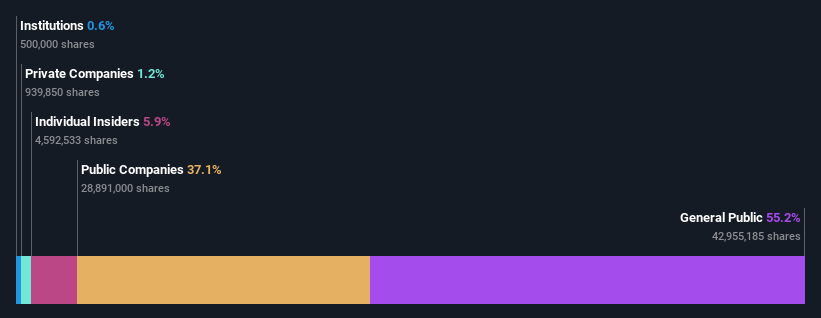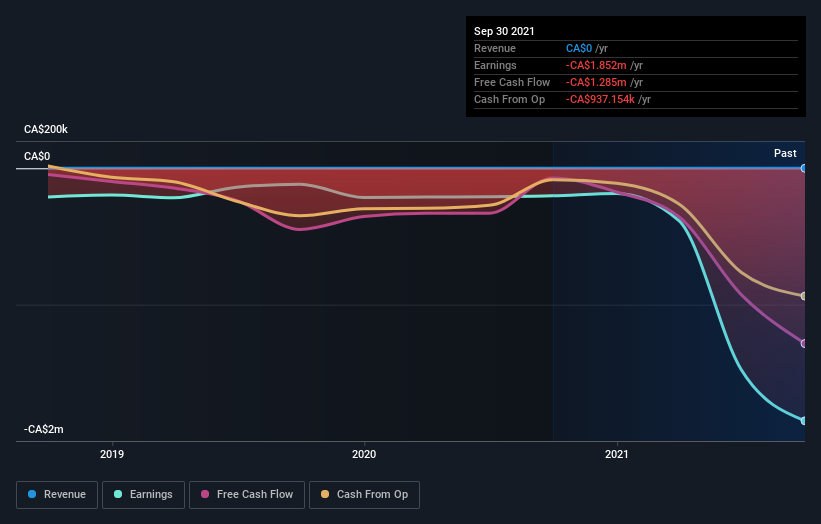Here's What Atlas Salt Inc.'s (CVE:SALT) Shareholder Ownership Structure Looks Like
A look at the shareholders of Atlas Salt Inc. (CVE:SALT) can tell us which group is most powerful. Insiders often own a large chunk of younger, smaller, companies while huge companies tend to have institutions as shareholders. Warren Buffett said that he likes "a business with enduring competitive advantages that is run by able and owner-oriented people." So it's nice to see some insider ownership, because it may suggest that management is owner-oriented.
With a market capitalization of CA$127m, Atlas Salt is a small cap stock, so it might not be well known by many institutional investors. Our analysis of the ownership of the company, below, shows that institutions don't own many shares in the company. Let's take a closer look to see what the different types of shareholders can tell us about Atlas Salt.
View our latest analysis for Atlas Salt
What Does The Lack Of Institutional Ownership Tell Us About Atlas Salt?
Small companies that are not very actively traded often lack institutional investors, but it's less common to see large companies without them.
There could be various reasons why no institutions own shares in a company. Typically, small, newly listed companies don't attract much attention from fund managers, because it would not be possible for large fund managers to build a meaningful position in the company. On the other hand, it's always possible that professional investors are avoiding a company because they don't think it's the best place for their money. Atlas Salt might not have the sort of past performance institutions are looking for, or perhaps they simply have not studied the business closely.
Atlas Salt is not owned by hedge funds. Vulcan Minerals Inc. is currently the largest shareholder, with 37% of shares outstanding. Patrick Laracy is the second largest shareholder owning 4.3% of common stock, and John Anderson holds about 0.8% of the company stock. Two of the top three shareholders happen to be Chief Executive Officer and Member of the Board of Directors, respectively. That is, insiders feature higher up in the heirarchy of the company's top shareholders.
Our studies suggest that the top 8 shareholders collectively control less than half of the company's shares, meaning that the company's shares are widely disseminated and there is no dominant shareholder.
While it makes sense to study institutional ownership data for a company, it also makes sense to study analyst sentiments to know which way the wind is blowing. As far as we can tell there isn't analyst coverage of the company, so it is probably flying under the radar.
Insider Ownership Of Atlas Salt
The definition of an insider can differ slightly between different countries, but members of the board of directors always count. The company management answer to the board and the latter should represent the interests of shareholders. Notably, sometimes top-level managers are on the board themselves.
Insider ownership is positive when it signals leadership are thinking like the true owners of the company. However, high insider ownership can also give immense power to a small group within the company. This can be negative in some circumstances.
We can see that insiders own shares in Atlas Salt Inc.. As individuals, the insiders collectively own CA$7.5m worth of the CA$127m company. This shows at least some alignment, but we usually like to see larger insider holdings. You can click here to see if those insiders have been buying or selling.
General Public Ownership
The general public, who are usually individual investors, hold a substantial 55% stake in Atlas Salt, suggesting it is a fairly popular stock. With this amount of ownership, retail investors can collectively play a role in decisions that affect shareholder returns, such as dividend policies and the appointment of directors. They can also exercise the power to vote on acquisitions or mergers that may not improve profitability.
Public Company Ownership
It appears to us that public companies own 37% of Atlas Salt. It's hard to say for sure but this suggests they have entwined business interests. This might be a strategic stake, so it's worth watching this space for changes in ownership.
Next Steps:
It's always worth thinking about the different groups who own shares in a company. But to understand Atlas Salt better, we need to consider many other factors. For instance, we've identified 4 warning signs for Atlas Salt (3 make us uncomfortable) that you should be aware of.
Of course, you might find a fantastic investment by looking elsewhere. So take a peek at this free list of interesting companies.
NB: Figures in this article are calculated using data from the last twelve months, which refer to the 12-month period ending on the last date of the month the financial statement is dated. This may not be consistent with full year annual report figures.
Have feedback on this article? Concerned about the content? Get in touch with us directly. Alternatively, email editorial-team (at) simplywallst.com.
This article by Simply Wall St is general in nature. We provide commentary based on historical data and analyst forecasts only using an unbiased methodology and our articles are not intended to be financial advice. It does not constitute a recommendation to buy or sell any stock, and does not take account of your objectives, or your financial situation. We aim to bring you long-term focused analysis driven by fundamental data. Note that our analysis may not factor in the latest price-sensitive company announcements or qualitative material. Simply Wall St has no position in any stocks mentioned.

 Yahoo Finance
Yahoo Finance 

